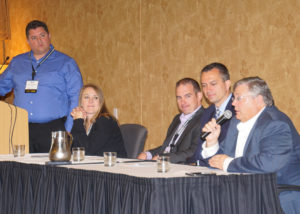
Four bank executives encouraged some 80 mid-career bankers to be proactive if they seek to advance their careers. “Whenever you can, ask ‘is there anything else I can do for you’,” counseled Scott Wakefield, president of First Minnesota Bank, speaking on a panel at the Leadership Education and Development Conference hosted by the Independent Community Bankers of Minnesota on Sept. 11-12 in Plymouth, Minn. “Do this consistently and you will impress your boss,” said Wakefield, who heads a $363 million bank based in Minnetonka, Minn.
“Have the ability to communicate well. Polish your skills,” advised Randy Dorn, executive vice president of the $204 million First National Bank of Battle Lake in Ottertail, Minn. “Rising stars can communicate.” He also urged bankers to become experts in specific areas of the bank. “Be the go-to person in your bank on a particular subject,” he counseled.
“People who take initiative impress me,” declared Anita Drentlaw, president of the $113 million New Market Bank in Elko New Market, Minn. “People who bring ideas do a great service,” she said. Ideally, she said, a person would bring two potential solutions to a problem, giving the manager a couple of options to consider.
Wakefield further encouraged bankers to attend as many community events as they can. “Even if you don’t like going to events, get out there and meet people,” he encouraged.
Andy Schornack, president and CEO of the $213 million Flagship Bank in Eden Prairie, Minn., reminded bankers to have fun. “You need to be accurate and accountable; we are bankers, after all. But don’t forget to have some fun; keep some balance.”
Sometimes, it can be difficult for younger bankers to persuade older colleagues to accept an idea they have for a change at the bank. Wakefield shared a story about his attempts more than 20 years ago to create a free checking account. His manager initially resisted and it wasn’t until he garnered the support of other managers and even board members that the bank decided to adopt the idea. Today, most of the bank’s customers have free checking accounts.
Dorn said that when suggesting a new approach, be sure to acknowledge the work that others have done at the bank previously. “You have to acknowledge what they have gone through to get to that point,” Dorn said.
Furthermore, Dorn encouraged the young bankers to do their homework. “The first question you are going to get is ‘what’s this going to cost?’ Be sure you have a well thought-out answer,” he said.
Drentlaw said it is important to think beyond the immediate area of impact, and try to assess the consequences of the new idea on the entire bank. The best ideas, she said, are those that are consistent with the bank’s strategic plan.
Wakefield urged bankers to work it out with those who resist the new idea. “I like to take them out to lunch and talk over the issue,” Wakefield said. “Acknowledge your differences and speak in a frank manner.”
Wakefield reminded bankers to remember why they were in the room. “Your managers sent you to a leadership development conference for a reason,” he said in answer to a question about succession planning. “Leadership changes affect many levels of the bank, and you are likely part of the plan.”
